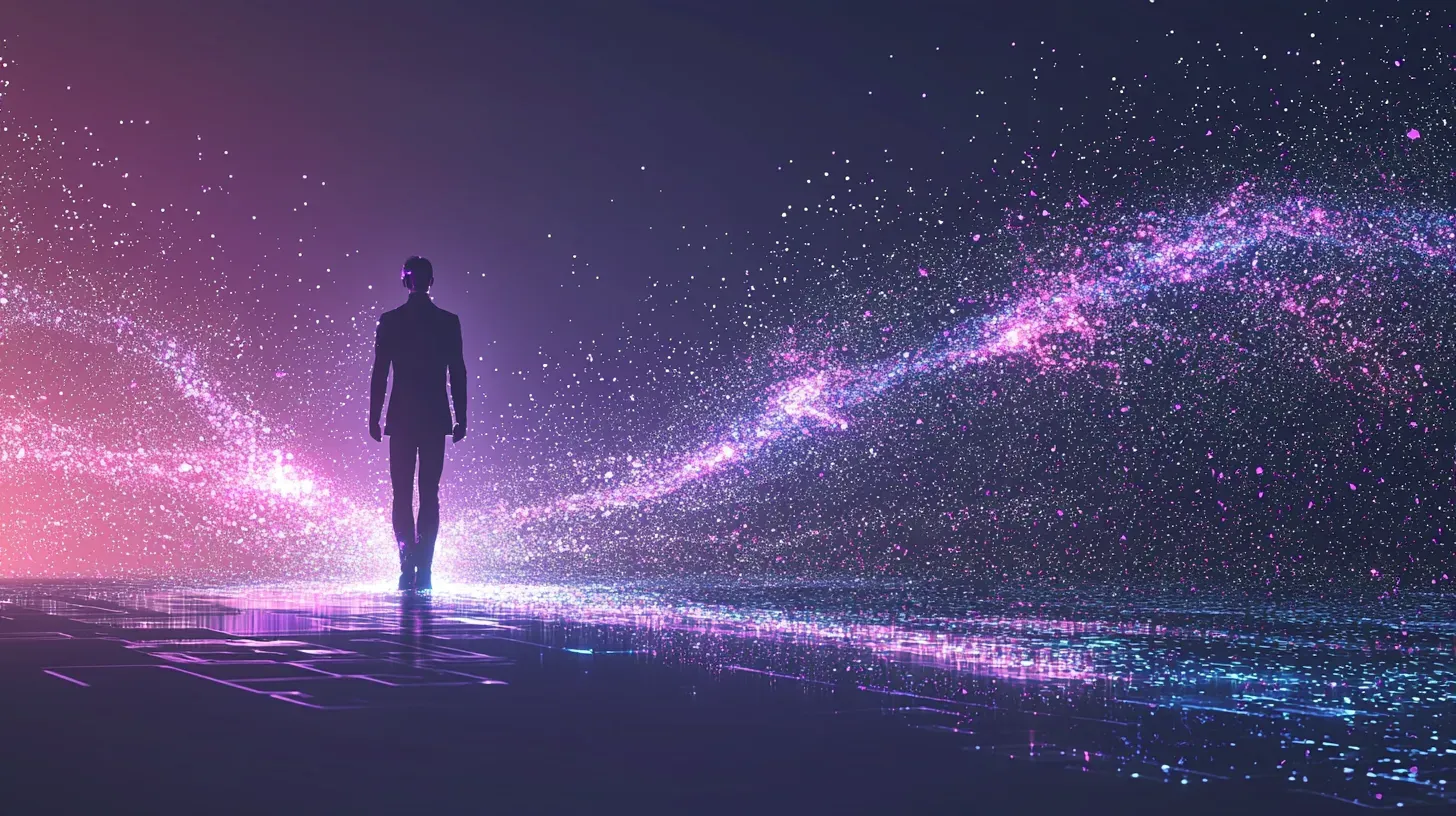Why We Should Use Blockchain and Artificial Intelligence to Enable the Imagination Age

When the web was developed over 25 years ago, the technologies in place significantly lowered the cost of building a global company. Thanks to the internet, it has become possible to reach a large part of the global population simply from behind your computer. Those companies who first understood the power of the web, and managed to execute their vision correctly, are now the leading global monopolies we are so familiar with: we use Google for finding information, Facebook or WeChat for social activities, Amazon to shop and Apple for our hardware, etc.
For years, these companies have understood that data is a goldmine. Since their beginning, these companies have rigorously been collecting and storing data, resulting in them not only becoming powerful monopolies but also contributing to a centralisation of the world wide web. This centralisation is in stark contrast to Sir Tim Berners-Lee’s vision of a decentralised web in which everybody participates and has full control over their data and the content that they create.
Content Controlled by Tech Giants
As a result, these companies have become exceptionally influential. They have access to large amounts of data of their customers, which they use and misuse to track (potential) customers around the internet, thereby often ignore existing privacy practices. These companies use customer data to their liking to earn big revenues through advertising, often without involving or informing the consumer in clear and understandable terms. In fact, 85 percent of online advertising spend goes to Google and Facebook, according to Morgan Stanley analyst Brian Nowak.
In addition, in recent years there has been an increase in fake news, clickbait, spam and copyright infringements enabled by these platforms. Although they say they are working on solutions, their actions speak differently; this type of content brings in a lot of advertising revenue. Besides, having centralised commercial organisations determine what is fake news and what is not, what is good or what is bad, is a very dangerous situation.
However, with media attention to these problems growing, people are increasingly becoming aware of the effects that emerging technologies have in the hands of such tech organisations; there is an increase in low-quality content, but more importantly, genuine content creators are no longer in control regarding distribution and compensation of the content they create. Instead, large (online) publishers and distributors own all the rights and the original content creator only gets a small percentage (55% on YouTube, 10-15% with book publishers and 0% on any content on Facebook). This does not only count for user-generated content, but also large news publishers miss out; 62% of Americans obtain their news through Facebook while publishers on Facebook only get paid $100 a day.
The Imagination Age
The result is that being creative, whether it is in creating written content (such as investigative journalism, academic articles or blogs), videos, music or other forms of creativity, hardly brings any revenue to creators. Apart from a very small niche of online superstars who have made millions. It is a winner takes all concept, leaving the large majority of content creators with (near) empty hands and the revenue owned by said tech giants, distributors or other intermediaries. And that is a problem. Especially with various reports estimating that 30-50% of existing jobs will disappear in the coming years due to technology and all those people need a new source of income, which could be through content creation. It is time for change. It is time for the Imagination Age.
The Imagination Age was first coined by designer and writer Charlie Magee in 1993, and it is a theoretical period after the Information age when creativity and imagination become the primary drivers of economic value. Emerging technologies such as Blockchain and Artificial Intelligence will play a key role in enabling the Imagination Age; not only will they empower content creators and enable them to earn a fair reward instantly, they will also enable creators to develop better content and earn higher revenues.
Artificial Intelligence Will Result in Better Content
Although artificial intelligence is increasingly becoming more creative itself and is getting better at creating content, I don’t believe AI will replace content creators anytime soon. Instead, I believe artificial intelligence could bring significant benefits to content creators, ranging from creating and finding better content to making more revenue with that content. As such, AI can empower content creators to make them more creative.
First of all, AI and machine learning can help content creators create content that better matches with what their audience is looking for, thereby increasing the odds that the content is discovered; basically matching creativity with demand in the market and removing any guesswork. Content creators can use AI to understand topic opportunities, to understand what the audience is looking for, discover patterns to learn which topics are becoming trending and matching their content to changing demand. The company BrightEdge Content helps creators understand the characteristics of top content and offers recommendations for improving that content. In addition, platforms such as Grammarly help improve your grammar, which makes content more attractive to readers.
Also, AI can also help content creators get inspiration and help them kick-start the process of creating awesome content. This is especially relevant for written content as it can help writers with a writer’s block. The startup Articoolo does exactly that and their AI helps writers summarise articles, come up with titles and can even write a complete article based on a few input keywords. It works with IBM’s Watson and is effectively an ideation tool, although it is not yet capable of writing articles on any topic that you want.
Finally, artificial intelligence can help content creators determine the right price for their content. The price elasticity of content depends on a variety of factors, ranging from the quality of the content, the market, the availability of other content, the expertise of the creator and many more variables. Therefore, determining the right price for content is difficult, but artificial intelligence can help as it incorporates a variety of data sources to determine the best price for the right type of content through the right channel. The right price can be the difference between making money with your content or not.
All in all, I believe artificial intelligence can help us become more creative and assist us in creating better content, instead of replacing us when it comes to creativity. The better AI becomes at creating content, the better it will help content creators be creative. However, being creative alone is not sufficient for content creators, it is also time that content creators can take control over their work, how and where it is distributed and for how much, which becomes possible when Blockchain is brought into the equation.
Blockchain Will Give Full Control to Creators
An important frustration of content creators is the difficulty in protecting your copyright. Even this article is likely to appear on other websites apart from LinkedIn, Datafloq or my speaker website, without my permission and without me being able to do anything about it. Ripping videos off YouTube is extremely easy and websites such as the Pirate Bay continue to exist, thereby damaging those who created the content.
However, Blockchain offers immutable, verifiable and traceable records. Already, it can bring back data ownership to consumers and will do the same for content ownership. Recording metadata and copyright information on a blockchain is the first step to put content creators more in control as it establishes undeniably who created what content when. This information can be used to take back control if someone violates your copyright, but it is not yet sufficient to bring back control completely.
To achieve that, we also need to establish a decentralised infrastructure where content creators know when their content is distributed across the web by whom. If that information is available in real-time, the next step should be to allow content creators to deny the content distribution through certain channels, for whatever reason. This would require an additional layer on the web. A difficult challenge.
The final stage of giving back control to creators is real-time payment when content is consumed, directly from consumer to producer, without intermediaries confiscating the revenue. Multiple Blockchain startups are working on this, including Akasha, Steem.it, Decent, Synereo and indeed, also we at dscvr.it. It requires a cryptocurrency and real-time payments and distribution of revenues using smart contracts. Based on your input, you are rewarded accordingly, instantly. As such, Blockchain offers content creators the possibility to take back control and be rewarded fairly and instantly.
The Convergence of AI and Blockchain
When artificial intelligence and Blockchain are combined, it will truly help content creators to be more creative, create better content, take back control and make more revenue instantly. A true paradigm shift that enables us to move into the Imagination Age and limit the powers of current monopolies. However, the convergence of artificial intelligence and Blockchain offers an additional advantage. It offers us a chance to combat fake news, clickbait, spam and copyright infringements once and for all. Using artificial intelligence and the community to determine the quality of content and detect clickbait, fake news and spam with a blockchain-based content licensing and reputation system will help detect and flag such content.
Detecting and flagging such content is important in the Imagination Age; as Raymon Kurzweil states in The Singularity is Near; when we live in a world where anything can be imagined, imagination only becomes more important. However, the same goes for the quality of content. A world revolving around fake news, spam, clickbait and plagiarism is a poor world. If we allow content being controlled as well as monetary rewards being confiscated by a few tech giants, we have done something wrong. Therefore, it is time to create a better system, be more creative and reward content creators fairly and instantly. After all, especially in the Imagination Age where content creation becomes an important driver of economic value, we have a moral obligation to do so. It is time for change. It is time for the Imagination Age.





